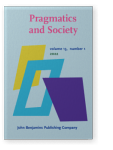Vol. 13:1 (2022) ► pp.126–150
Using wǒmen (we) to mean s/he in Chinese parents’ interaction
Interpersonal meanings and relational work
Using the first-person plural pronoun wǒmen (we) to refer to a child (=he/she) is repeatedly observed in Chinese parents’ interaction. To understand its interpersonal meanings, this study investigates this non-prototypical pronoun use in Chinese parents’ community of practice. The analysis shows that the non-prototypical use of this pronoun not only displays agency and connection between parents and children but also reveals the seemingly close but detached relationship among parents. This non-prototypical pronoun use unveils the complex and dynamic nature of relational work. We argue for the significance of community of practice in relational work studies, as it can proffer social and cultural contexts to pronoun use and a situated understanding of interactants’ interpersonal relationships. The present study contributes to the documentation of the non-prototypical use of wǒmen in Chinese contexts and the comprehension of its interpersonal meanings.
Article outline
- 1.Introduction
- 2.First-person plural pronoun and relational work
- 3.Methodology
- 4.Interpersonal meanings of the non-prototypical use of wǒmen
- 4.1Relationship between parents and children
- 4.1.1Displaying agency
- 4.1.2Creating connection and collectivity
- 4.1.3Negotiating dynamic and situated parent-child relationship
- Agency vs dependence
- Connection vs. power
- 4.2Relationship among parents
- 4.2.1Building solidarity
- 4.2.2Implying social distance
- 4.1Relationship between parents and children
- 5.Contextual and socio-cultural issues related to the pronoun use
- 6.Discussion and conclusion
- Acknowledgements
- Note
-
References
